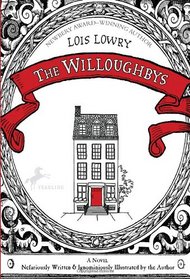Reviewed by Katie Hayes for TeensReadToo.com
Lois Lowry, winner of two Newbery medals, is not only one of the most beloved modern authors of children's fiction, but also one of the most versatile. She's done comedy (the ANASTASIA KRUPNIK series), drama (A DUMMER TO DIE), historical fiction (NUMBER THE STARS), and even dystopian fantasy (THE GIVER). In her latest book, THE WILLOUGHBYS, she proves her mastery at yet another genre: parody.
The object of parody here is old-fashioned children's books. Accordingly, the titular Willoughbys are "an old-fashioned family," and constantly refer to themselves as such. The Willoughby children are Timothy, the bossy oldest child; indistinguishable twins who are both named Barnaby (referred to as "A" and "B"); and the overlooked youngest child, Jane.
"Shouldn't we be orphans?" Timothy asks one day. While they're not, Mr. and Mrs. Willoughby, unbeknownst to them, are about to abandon their children in a plot inspired by HANSEL AND GRETEL. But the Willoughby children are too busy doing all the things that an old-fashioned family should do to care very much. All the elements of old-fashioned children's literature are included in the plot. Abandoned baby in a basket? Check. Mysterious nanny? Check. Reclusive tycoon living in squalor? Check. Really bad fake German? Well - that might be a new one.
It's impressive how effectively Lowry pokes fun at literary cliches so widespread that most of us have never even thought about them. It had never occurred to me how prevalent some of the elements of classic children's literature are until I read THE WILLOUGHBYS, but once it did, I wondered why I'd never read a similar parody. Lowry gets plenty of jokes in while still keeping the plot moving, and the result is a fast, funny read. Adding to the fun are the glossary and bibliography at the end of the book. Here's a sample glossary entry: "Tycoon means somebody who has amassed great wealth and power in business. Usually a tycoon is a man, for some reason. Maybe Oprah Winfrey is a tycooness." The bibliography consists of a list of "books of the past that are heavy on piteous but appealing orphans, ill-tempered and stingy relatives, magnanimous benefactors, and transformations wrought by winsome children," which include MARY POPPINS, ANNE OF GREEN GABLES, and the BOBBSEY TWINS series.
While teens and adults will also find this book hilarious, it's appropriate for even those younger readers in elementary school. Readers will laugh out loud - and they might even be moved to pick up one of the books that inspired it.
Lois Lowry, winner of two Newbery medals, is not only one of the most beloved modern authors of children's fiction, but also one of the most versatile. She's done comedy (the ANASTASIA KRUPNIK series), drama (A DUMMER TO DIE), historical fiction (NUMBER THE STARS), and even dystopian fantasy (THE GIVER). In her latest book, THE WILLOUGHBYS, she proves her mastery at yet another genre: parody.
The object of parody here is old-fashioned children's books. Accordingly, the titular Willoughbys are "an old-fashioned family," and constantly refer to themselves as such. The Willoughby children are Timothy, the bossy oldest child; indistinguishable twins who are both named Barnaby (referred to as "A" and "B"); and the overlooked youngest child, Jane.
"Shouldn't we be orphans?" Timothy asks one day. While they're not, Mr. and Mrs. Willoughby, unbeknownst to them, are about to abandon their children in a plot inspired by HANSEL AND GRETEL. But the Willoughby children are too busy doing all the things that an old-fashioned family should do to care very much. All the elements of old-fashioned children's literature are included in the plot. Abandoned baby in a basket? Check. Mysterious nanny? Check. Reclusive tycoon living in squalor? Check. Really bad fake German? Well - that might be a new one.
It's impressive how effectively Lowry pokes fun at literary cliches so widespread that most of us have never even thought about them. It had never occurred to me how prevalent some of the elements of classic children's literature are until I read THE WILLOUGHBYS, but once it did, I wondered why I'd never read a similar parody. Lowry gets plenty of jokes in while still keeping the plot moving, and the result is a fast, funny read. Adding to the fun are the glossary and bibliography at the end of the book. Here's a sample glossary entry: "Tycoon means somebody who has amassed great wealth and power in business. Usually a tycoon is a man, for some reason. Maybe Oprah Winfrey is a tycooness." The bibliography consists of a list of "books of the past that are heavy on piteous but appealing orphans, ill-tempered and stingy relatives, magnanimous benefactors, and transformations wrought by winsome children," which include MARY POPPINS, ANNE OF GREEN GABLES, and the BOBBSEY TWINS series.
While teens and adults will also find this book hilarious, it's appropriate for even those younger readers in elementary school. Readers will laugh out loud - and they might even be moved to pick up one of the books that inspired it.
It was cute. I read it to my children. They liked it but did not love it. I did like how it had a happy ending. NOT for really small kids... a few morbid things in this book.




